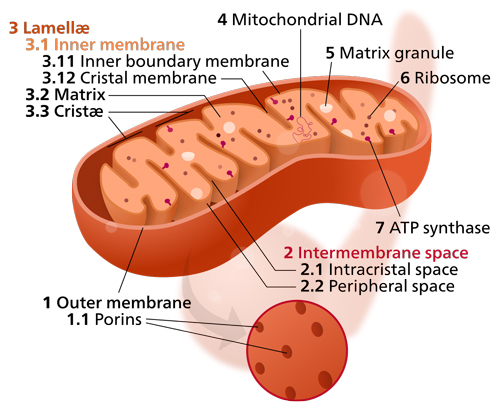
Are you someone who likes to buy new batteries when the old ones run out or do you prefer rechargeable ones? According to a well known website ‘Rechargeable batteries offer a cost effective option of using devices which require portable power, as the energy supply is recharged and reused’. Did you know that, with the exception of blood cells, we have batteries or ‘powerhouses’ in every cell of our bodies? These batteries within are called mitochondria and their main task is to produce the energy which your cells need to function and to regulate cellular metabolism.
In the past decade there has been an exponential growth in the understanding of how these cellular powerhouses work, particularly with regard to chronic health conditions. There are 10 million billion mitochondria in an adult human being, approximately 10% of our bodyweight!
Each cell has their own ‘shuttle service’ that transports chemical energy within the cells. The brain and the heart have the highest energy demands in the body and therefore create the most of these transporting molecules, known as ATP, up to 6kg a day! In fact the energy charge created is almost equivalent to a lightning bolt! Amazingly, a healthy person at rest produces their body weight in ATP every day! This is due to the fact that ATP cannot be stored.

Mitochondria float freely throughout the entire cell. Mitochondria are made of an outer and inner membrane. The outer membrane covers the organelle like a skin. The inner membrane folds to create layers call cristae. There is a fluid in the mitochondria known as the matrix. Mitochondria is often referred to as the “powerhouse” of the cell. They work as a digestive system; they take in nutrients, break them down, and create molecules with energy for the cell.
These ATP transporters are made from:
- carbohydrates (grains, seeds, root veg etc)
- fats (nuts, avocado, fish, olive oil etc)
- protein (meat, fish, lentils, eggs etc)
Eating more however does not mean that you will have more energy! In fact, over eating or over-nutrition can eventually lead to a decrease in ATP production. Mitochondria are also very flexible and alter their behaviour based on whether the incoming fuel source is carbohydrates or fats.
What happens if mitochondria don’t function correctly?
Mitochondrial dysfunction can play a major part in Parkinson’s disease, Alzheimers, metabolic syndrome and many cancers. It has also been associated with migraines, fibromyalgia, chronic fatigue syndrome and cardiovascular disease. Symptoms may include fatigue, digestive problems, muscle aches and respiratory problems amongst others.
How do they become damaged?
Mitochondria are especially susceptible to nutrient deficiencies, a sedentary lifestyle, high levels of stress, poor sleep, sugar & processed foods, alcohol, chronic infections and environmental toxins such as POPs (persistent organic pollutants found in pesticides & solvents). Many prescription drugs (especially aspirin, L-dopa, anti-inflammatory pain killers and statins) prescribed frequently or taken for a long time may impact mitochondria as well.
NB. NEVER stop taking prescribed medication without first having a discussion with your GP.

Plenty of sunlight and exercise is always good for you
Here are some strategies to improve your mitochondrial health:
- Eat an anti-inflammatory diet such as the Mediterra nean diet (a plant based eating plan made up of fresh fruit and vegetables, with 3 portions oily fish a week, limited dairy and reduced amounts of red meats)
- Reduce sugar, processed foods & alcohol
- Make movement part of your daily routine
- Improve your sleeping habits
- Use intermittent fasting (eat during an 8-10 hour
- window, fast during the remaining 14+hrs to allow
- your system time to rest & recharge)
- Practice deep breathing to reduce the ‘fight or flight’ stress response
- Get plenty of sunlight for good levels of Vitamin D
- Drink good quality water
One vital nutrient for the mitochondria is Coenzyme Q10 (CoQ10) which is found in grass fed meats, wild caught fish, grass fed butter, avocados, olives & olive oil, broccoli, cauliflower and sweet potato. Many GPs now prescribe CoQ10 alongside statins to combat the reduction of CoQ10 in the heart mitochondria by the statin medication. Other nutrients required for the production of ATP are magnesium and B vitamins. A good multi vitamin which has CoQ10 included can be very supportive. Personalised nutrition protocols are very successful at optimising health and wellbeing particularly as practitioners understand the role which an individual’s diet and lifestyle choices play in chronic health issues and disease. If you are concerned about any issues raised in this article and would like a free 30 minute phone call to discuss how I can support you on your journey back to health please email me: sue@thegenuinelivingcompany.com
07961 990087
**Next month I will be doing a Q&A session so if you have any health questions that you would like answered please email them to me at the above email address
*Don’t forget to follow me on Facebook and Instagram! (@the_genuine_living_company)











